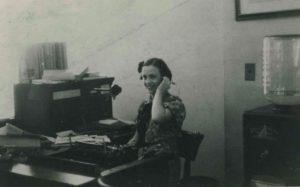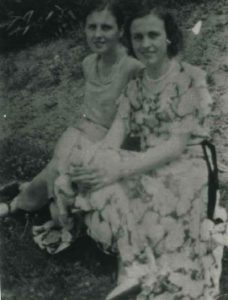Irish Childhoods are Different
 My mother could foretell death. She’d inherited the family banshee, the Irish harbinger who shrieks her fatal message to one member of each generation to let them know that someone is about to die. “What a pity about John,” she might say, “he’ll be gone by June 15th,” and close family members knew enough not to make plans with John for the 4th of July.
My mother could foretell death. She’d inherited the family banshee, the Irish harbinger who shrieks her fatal message to one member of each generation to let them know that someone is about to die. “What a pity about John,” she might say, “he’ll be gone by June 15th,” and close family members knew enough not to make plans with John for the 4th of July.
She hated her talent, considering it more curse than gift, but accepted it with a certain Irish resignation, knowing she came from a long line of mystically gifted women — telepaths, healers, psychics, all sorts — each of whom had to bear with whatever weird talent popped out of the mystical Kellogg’s Variety Pak.
“With so many gifts in the gene pool,” she’d lament, “wouldn’t you think God could’ve given me something less depressing?” But legend has it that only 30 of the ancient families in Ireland possess a bona fide Banshee, and as two of the families are ours, there may have been a certain inevitability to my mother getting stuck with one. Be that as it may, she bore with her otherworldly visitor dutifully, as she bore with her other sufferings. Not quietly, but dutifully.
My mother carried the burden of historic sadness like a giant rock. It weighted her down so that her soaring mind was earthbound but fluttery, like an injured bird straining for the sky.
I thought of her as a scholar in the scullery, a brilliant mind born too soon for the women’s movement, too late for acquiescence, with a heart too wounded to be confident. But with Scorpio on the cusp of her 3rd house – the meanest mouth in the Zodiac — she had a way of seeming not merely confident but omnipotent. I was forty before I found the courage to shout her down. Why God deployed a McCormack reaper to harvest a daisy, is one of the greater mysteries.
More Than Meets The Eye
I was born with a caul over my face – a displaced placenta the doctors would call it, but the Irish believe it to be the sign of a child born with Second Sight. And sure enough, I could see things other people couldn’t — like the occasional angel, and the molecular changes in the air that precede rain – but I don’t remember thinking that was odd until I got to school and learned that other people’s families didn’t do the things mine did. Even then, I thought I just had better eyesight than the others.
My mother and her two sisters tended to communicate by telepathy. “I’ve called Mary,” my mother would say, meaning she’d put out a psychic all-points-bulletin for her sister to call her on the telephone from wherever she was. Within minutes the phone would ring. Or “Helen’s on her way to the hospital again,” and off she’d go with a little suitcase full of hospital necessities for her ailing sib.
It wasn’t until I was grown that I found out my mother’s family had been famous in their little corner of Ireland for such mystical abilities, so I took all this for granted as ordinary parts of an Irish Catholic childhood, a mystery in itself. Irish Catholicism being a rare blend of magic and repression, open minded about the unseen universe, but full of didactic rules and regulations about everything else. And this was before we even knew about the pedophiles…
My father, whom I deemed perfect in most things, believed in the Church’s rules and followed them implicitly. My mother, more irreverent and iconoclastic, referred to herself as a retired Catholic – not lapsed, mind you, as that would presuppose a failure of some kind – but one who’d been there, done that, and moved beyond such confines. She gave me a Bible of the World, against strict Church dictum, and sent me to Protestant Bible Camp. The World Bible housed the scriptures of Jews and Muslims and Hindus and other Heathens, and I loved it with all my heart. All those exotic roads leading to God, and not one of them Catholic. Who knew?
My mother was cool as a November dawning, my father warm as cocoa. I used to try to make her happy, by being good, by being funny, by being smart, by being kind. But she never smiled — my father said it was because she suffered a rare disease that had caused shadows on her teeth, but I knew it was a deeper darkening, a sorrow that had seeped into her marrow in childhood, sucking out the joy. I wanted a milk and cookies mommy, with a warm bosom and an understanding heart. Instead I was given an archetype in an apron, with a laser intellect, an iron whim, and a banshee. God is noted for Her quirky sense of humor.
Years later, when I had children of my own, I used to take them, after I got home from work, to a tiny neighborhood park to play for an hour at dusk. A little towheaded boy would come to see me each evening, climb up on my lap, nuzzle his nose into my breasts, stroke my hair, then climb down, say, “Fank you,” and go about his business. It took me a week to learn that my wheeler-dealer daughter Cee Cee had rented me out to him. “His mother has short hair and a hard chest,” she explained, “so I traded you for the use of his Big Wheel.”
Love and Learn
I would have given anything in childhood for the use of a soft-chested, long-haired surrogate, but if a Valkyrie was what I’d been given by Fate, there were certain compensations. My mother ran the PTA and was a “pillar of the community.” I’m not sure communities have pillars any more, but back then it was a good thing if everyone knew and respected your mom. Her picture was often in the local newspaper and she was once quoted as the authority on disciplining children, which I thought was a reprehensible thing to be an authority on, but it made her famous in a local sort of way.
I accepted her word as gospel, even when it strained credulity. For example, when I was four years old I awakened one morning to find the street outside our house lined with funny black bowling balls, each with a small flame on top. I asked my mother what they were there for.
“They’re widening the street, dear,” she replied authoritatively, and I accepted the information, odd as it seemed. I trusted my mother’s vast knowledge implicitly, so I sat on the curb through an entire afternoon, waiting for some sign that the magical black balls were somehow making the street wider. As far as I could tell the street hadn’t moved an inch since breakfast.
I remember pondering how the balls might perform the impressive deed – could the acrid green fumes they were exuding push the curbs back, somehow? Could those innocuous little flames melt the asphalt and move everything around like unset Jell-O? If so, I thought the process might be subtle and time consuming. To be on the safe side I’d brought an orange and five peanut butter cookies for sustenance.
Such gullibility was a bit of a problem later on in life, but in childhood my acceptance of magic and my mother’s erudition was probably not a bad thing.
So I send these thoughts to her across the years:
Prayer for My Mother
By Cathy Cash Spellman
It’s hard to forgive a Mother’s love.
It takes years to understand the sleepless nights,
The sacrifices and the selflessness.
You have to do it, too, before you know
That the admonishments were love
The ferocity was love
The pain in the ass nagging was love.
I wanted a milk and cookies Mom
With soft breasts and a softer heart.
Instead a warrior,
Ahead of her time by generations
Gifted, angry, trapped in a time
Too small for her spirit.
And so she vented all her frustrated power
On us, her hapless daughters,
Pummeling us into the Future.
So what did we learn?
Strength and endurance
Integrity and fortitude
Morality and high drama
How not to live our lives
How not to raise our children.
But she was mighty as Asia
An archetype consigned to the PTA
I would have changed her from the ground up
If I could have
Now, I sometimes think it’s good that
God didn’t give me the option.
© Cathy Cash Spellman/The Wild Harp & Co. Inc 2011
« Swimming in the Ancestral Gene Pool | Chatting with Heaven »